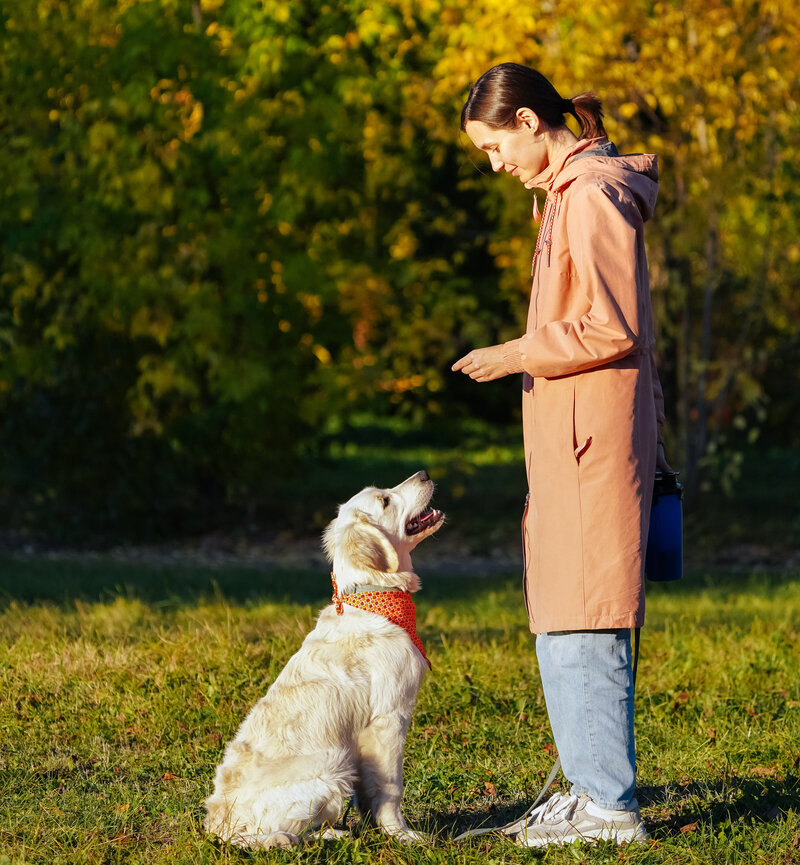
It’s true that dogs are genetically programmed to be part of a pack and to bond with their human companions. However, that doesn’t mean a dog of any age feels automatically comfortable with other canines, people, or new situations. In fact, puppies can become anxious, difficult to control, or even aggressive when introduced to anything new or out of the regular routine without proper socialization.
Once you’ve done your research and selected the right puppy or dog for your family, it’s time to bring them home. For the first few weeks, you’ll spend time bonding with your new family member and getting them used to the household routine. After that, your job is to continue patient, consistent dog training in different environments.
We call this process “socialization.” While socialization with strangers of all ages and other dogs is certainly a priority, it also refers to getting your dog used to different places, environments, sights, sounds, and experiences. A well-socialized dog is calmer, more confident, and well-behaved, so your time and efforts will pay off.
Note: Your dog’s health is a priority. Make sure your puppy is current on their vaccinations before doing too much exploration outside the home or anywhere other dogs are.
Other than being more mobile and adept at navigating the world, puppies are just like babies. Everything is new to them. They’ll need to learn all kinds of new things and this will take time.
In addition to the obvious puppy training tasks like potty training and following basic commands, your puppy may need to learn how to:
Your puppy or new dog’s fear or anxiety is completely normal, and your patience and consistent socialization efforts are the keys to moving beyond it.
Small treats and positive reinforcement are essential when socializing your dog. If you become anxious, irritated, or angry, your dog will pick up on that. It gets confusing quickly because the very act of trying to make your puppy calmer in the presence of new or strange things backfires because they associate them with your negative emotions. Getting yourself into a calm, patient, and positive state of mind is the first step of any puppy or dog training session, and the same is true for socialization sessions.
As you make your way through the world, encountering new things, stay calm and imagine radiating that calm energy to your dog. Then give them lots of praise and a healthy treat when they remain calm in the face of something new or startling. We recommend reading our post, Understanding Your Dog’s Body Language, since puppies use the same signs to express their happiness, fear, nervousness, or aggression.
Socialization is an ongoing process. While the first 12 to 16 weeks are the best window of opportunity, socialization lasts for a lifetime. Our trainers have worked with hundreds of adult rescue dogs who are successfully socialized at more mature ages.
The key is not to take things too fast or work at it for too long. For example, if your current socialization focus is getting your new dog accustomed to strangers, start small. Introduce one or two neighbors or have a few family members stop by for a brief period. Then, when you’re at the park, have a few strangers feed your dog a favorite treat. Praise highly and then call it a day before the dog becomes overstimulated. Over time, and by witnessing your dog’s calm demeanor, you can increase exposure time.
Socialization is automatically built-in to any group puppy or dog training class. The benefits of these classes are invaluable. Not only will your dog be introduced to other dogs, people, sights, and experiences, but you’ll also get personalized information about how to train your dog using gestures, standard words/commands, and proper reinforcement. In addition, you can share what you’ve learned with the whole family, supporting your dog’s wellbeing and household (aka “pack”) relationships.
Some dog owners believe that once they’ve taken a dog training class or they’ve socialized their dogs for a few months, it’s A-OK to stick around the house again. This is not a good idea. Dogs can regress without consistent exposure to different stimuli throughout their juvenile and early adult lives.
You may be surprised to watch your formerly well-socialized puppy bark aggressively at a new neighbor’s toddler or growl when a passerby reaches out to pet them. In fact, we’d argue that lack of proper and consistent socialization is the primary reason for most dog aggression (not getting enough exercise or play time is a very close second).
Do you have a new puppy or dog in the house? Have questions or concerns about how to socialize your new puppy or dog training in general? Never hesitate to get in touch with us here at Alternative Dog Training, (734) 462-2810. From one-on-one training in the home to group dog classes or our celebrated Doggy Boot Camps, we’re here to ensure your dog is happy, healthy, well-adjusted, and adequately socialized to take on the big wide world. Contact us to schedule a consultation.